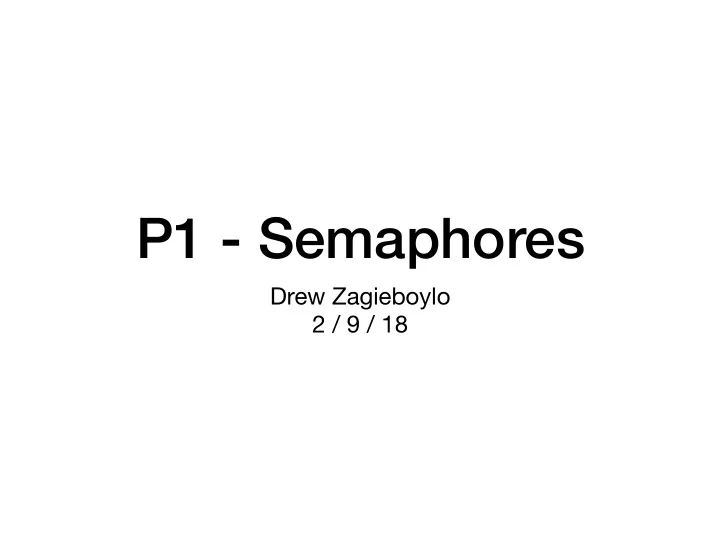

P1 - Semaphores Drew Zagieboylo 2 / 9 / 18
Thread Death … … void hello_w() { printf(“Hello World!”); return; ra(&mt_exit) hello_w } … sp … void mt_exit() { //do cleanup while (1) {}; }
Thread Death … mt_exit … void hello_w() { sp printf(“Hello World!”); return; } pc void mt_exit() { //do cleanup while (1) {}; }
Thread State Transitions yield, interrupt, Init Finished descheduled done, Admitted to thread_exit() Run Queue dispatch Ready Running I/O or thread I/O operation completion join(), wait() Waiting TCB: Registers:
Thread State Transitions * * - Have Queues yield, interrupt, Init Finished descheduled done, Admitted to thread_exit() Run Queue dispatch Ready Running * I/O or thread I/O operation completion join(), wait() Waiting * TCB: Registers:
Thread Death Cleanup Thread void cleanup() { while (1) { void mt_exit() { Problems? //remove thread to clean //do cleanup //from queue put current thread on cleanup queue //free its stack while (1) {}; //free its tcb } } }
Thread Cleanup void cleanup() { • Cleanup thread needs while (1) { //remove thread to clean to be scheduled //from queue How ? • Shouldn’t run when //free its stack //free its tcb there’s nothing to clean } }
Semaphores! Finally I should like to thank the members of the program committee who asked for more information on the synchronizing primitives and some justification of my claim to be able to prove logical soundness a priori . In answer to this request the appendix has been added , of which I hope that it gives the desired information and justification. • Edsger W. Dijkstra. 1967. The structure of the “the”-multiprogramming system. In Proceedings of the first ACM symposium on Operating System Principles (SOSP '67), J. Gosden and B. Randell (Eds.). ACM, New York, NY, USA, 10.1-10.6. DOI=http://dx.doi.org/10.1145/800001.811672 • https://dl.acm.org/citation.cfm?id=811672
Semaphores • Functions: • Stateful: • P(sema) • count procure -> block • queue of threads this thread until resource can be procured • V(sema) vacate -> release this resource and continue
Thread State Transitions yield, interrupt, Init Finished descheduled done, Admitted to thread_exit() Run Queue dispatch Ready Running I/O or thread I/O operation completion join(), wait() Waiting TCB: On semaphore’s Queue Registers: On stack
Thread State Transitions yield, interrupt, Init Finished descheduled done, Admitted to thread_exit() Run Queue dispatch Ready Running semaphore_P()* Semaphore_V()* Waiting TCB: On semaphore’s Queue Registers: On stack
Example var x = 0; void inc() { void dec() { int i = 0; int i = 0; (for; i < 1000; i++) (for; i < 1000; i++) x++; x--; } }
Example var x = 0; void inc() { void dec() { int i = 0; int i = 0; (for; i < 1000; i++) (for; i < 1000; i++) x = x + 1; x = x - 1; } } NOT ATOMIC!
Example var x = 0; var lock = sema(1); void inc() { void dec() { int i = 0; int i = 0; (for; i < 1000; i++) (for; i < 1000; i++) x = x + 1; x = x - 1; } }
Example var x = 0; var lock = sema(1); void inc() { int i = 0; void dec() { (for; i < 1000; i++){ int i = 0; P(lock); (for; i < 1000; i++) x = x + 1; x = x - 1; V(lock); } } }
Example var x = 0; var lock = sema(1); void inc() { void dec() { int i = 0; int i = 0; (for; i < 1000; i++){ (for; i < 1000; i++){ P(lock); P(lock); x = x + 1; x = x - 1; V(lock); V(lock); } } } }
Semaphores • Functions: • Stateful: • P(sema) • count procure -> block • queue of threads this thread until resource can be procured requests = sema(0); while (requests->count > 0) { • V(sema) … … vacate -> release } this resource and continue
Semaphore Invariants • Count: • If c ≥ 0 • The number of resources available • If c ≤ 0 • The number of threads waiting on the queue
Thread Cleanup void cleanup() { while (1) { //wait for thread • Cleanup thread needs //to be on queue to be scheduled //remove thread to clean //from queue • Shouldn’t run when there’s nothing to clean //free its stack //free its tcb } }
Recommend
More recommend